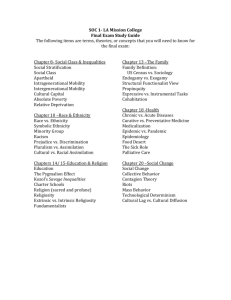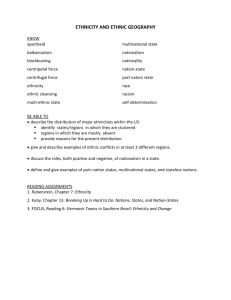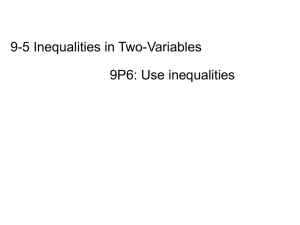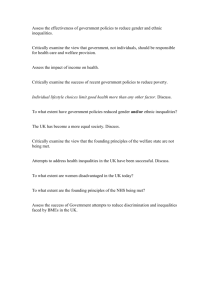Race and Ethnicity
advertisement
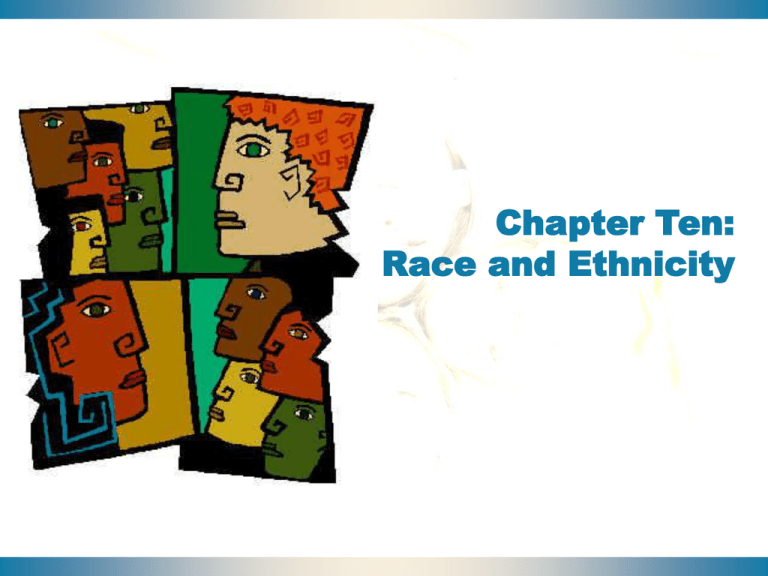
Chapter Ten: Race and Ethnicity Chapter Overview Laying the Race and Ethnic Sociological Relations in the Foundation United States Theories of Prejudice Global Patterns of Looking Toward the Future Intergroup Relations 2 Inequalities of Race and Ethnicity Understanding Race Race A category created by society to classify people on perceived similar physical characteristics Is Race a Myth or Fact? Inequalities of Race and Ethnicity Race and Ethnicity Race - Group with Biological Characteristics Myth 1 - Idea That Any Race is Superior All Races Have Geniuses and Idiots Myth 2 - Idea that Any Race is Pure Human Characteristics Flow Endlessly Together 4 Inequalities of Race and Ethnicity Relevance of Race as Scientific Concept 1. Current scientific thinking: “race” as a biological reality does not exist... 2. No set number of “races” in nature... 3. Rather, “races” are social constructs, reflecting divisions based on arbitrary physical traits. Inequalities of Race and Ethnicity Understanding Ethnicity • Ethnicity Statuses based on cultural heritage and shared “feelings of peoplehood” • Key factors that heightened or reduce our sense of ethnic identity • Relative size, power, appearance, and discrimination • Ethnic group A category of people set apart from others because of distinctive customs and lifestyles • Ethnic work The way people construct their ethnicity Inequalities of Race and Ethnicity Minority and Dominant Groups Minority Group - People Singled Out for Unequal Treatment by the Dominant Group Dominant Group – Group with wealth, power, and privileges Minority groups are not necessarily small in number 7 Inequalities of Race and Ethnicity Characteristics of a Minority Group Membership is an Ascribed Status Physical or Cultural Traits Held in Low Esteem by Dominant Group Unequal Treatment High ingroup marriage: marry within own group An awareness of inequalities and feel strong group solidarity 8 Inequalities of Race and Ethnicity Attitudinal Tools of Domination Racism Belief that one race is inherently superior or inferior to another Prejudice Preconceived judgments about a category of people Stereotype Static, oversimplified ideas about a category of people Inequalities of Race and Ethnicity An irrationally based negative, or sometimes positive, attitude toward a certain group of people. An attitude or subjective feelings Sets group boundaries Promotes social solidarity and identity (weness and sense of superiority). Inequalities of Race and Ethnicity Approaches to Prejudice Psychological Perspectives Frustration and Scapegoats – people who are unable to strike out at the real source of their frustration look for someone to blame The Authoritarian Personality – Theodor Adorno created a survey which measured: ethnocentrism, AntiSemitism, and support for strong, Authoritarian leaders and found that these criteria were connected 11 Inequalities of Race and Ethnicity Approaches to Prejudice Stereotyping One common reaction to strangers is to categorize them broadly. An oversimplified generalization by which we attribute certain traits or characteristics to a group without regard to individual differences Positive stereotypes Distort reality, but are nevertheless socially approved images held by one group about another. Easily becomes ingrained within everyday thinking. Inequalities of Race and Ethnicity Approaches to Prejudice Internalization of Dominant Norms People can learn to be prejudice against own group Members of groups held in low esteem by society may, as a result, have low self-esteem themselves. Banaji & Greenwald, “Implicit Association Test” Inequalities of Race and Ethnicity Approaches to Prejudice Socialization Individuals acquire the values, attitudes, beliefs, and perceptions of their culture or subculture, including religion, nationality, and social class. The child conforms to the parents’ expectations in acquiring an understanding of the world and its people We learn the prejudices of our parents and others which than becomes a part of our values and beliefs. Criticism Does not explain the origin of prejudice or why prejudice intensifies or diminishes over the years. Inequalities of Race and Ethnicity Discrimination Discrimination Unequal treatment of people because of their group membership Types of Discrimination Personal (Individual) discrimination Legal discrimination Institutional discrimination Inequalities of Race and Ethnicity The complex societal arrangements that restrict the life chances and choices of minority groups in comparison with those in the dominant group. Embedded into the social institutions. Benefits are given to one group are withheld from another. Maintains the disadvantage position of minority groups. Examples: sentencing inequalities, hiring practices, segregated housing, education, health care, etc. Inequalities of Race and Ethnicity Health Care Inequality Discrimination is does not have to be deliberate People unconsciously discriminate and those who are being discriminated against are unaware of it. Inferior Health Care African American mother is more than three times likely to die in childbirth than a white mother. African American babies has more than twice the chance of dying in infancy than does a white baby Race is a factor in Medical decisions The researchers examined hospital records of about 40,000 Medicare beneficiaries Whites are more likely than blacks to be given cardiac catheterization (a test to detect blockage of blood vessels) Inequalities of Race and Ethnicity Contemporary Discrimination in the United States Racial Profiling Refers to the action taken by law enforcement officials on the presumption that individuals of one race or ethnicity are more likely to engage in criminal activity. Leads law enforcement to routinely stop vehicles driven by Blacks and Latinos in the expectation of finding drugs in their possession. 2003 U.S. Department of Justice issued guidelines rejecting racial profiling In the statement it included a broad and largely undefined exception when “national security” concerns come into play. Inequalities of Race and Ethnicity Minorities are suspected and arrested for more crimes than whites. Minorities face more serious charges and are given more serious penalties and longer sentences than whites for the same crimes. Prison and Capital Punishment (1998) Black defendants were 38% more likely to be sentenced to die than others who committed similar crimes. African Americans constitute slightly more than 12% of the American population They account for more than 50% of all federal and state prisoners Inequalities of Race and Ethnicity The Civil Rights Act of 1964 dramatically altered historic patterns of discrimination Mandated that the government take affirmative action to ensure “equality of employment opportunity” For several decades, affirmative action accomplished a great deal 1960 10% of African American households were in the middle class 1990 30% of African American households were in middle-class 1990 their number in high-paying professional and technical occupations had increased by over 100% Inequalities of Race and Ethnicity Even with such gains there still remains a sizeable economic gap between whites and most other minorities. Inequalities of Race and Ethnicity Functionalist – Sherif Study Prejudice is functional as it brings people together Can create negative stereotypes (dsyfunction) Conflict – Prejudice is beneficial to the dominant group as it keeps minority groups oppressed Power Split Labor Force Symbolic Interactionist – Labels lead to selective perception – we see what we want to see Copyright © Allyn & Bacon 2009 22 Inequalities of Race and Ethnicity Dominant-Minority Group Relations Cultural Pluralism When groups cooperate while still retaining their distinctive identities and lifestyles Assimilation Process where minority groups lose their identities & conform to the dominant group Segregation Physical or social exclusion of minority groups from dominant group activities Genocide Deliberate and systematic elimination of minority group members Inequalities of Race and Ethnicity Race & Ethnic Diversity in U.S. White Anglo-Saxon Protestants Native Americans Latinos African-Americans Euro-American Ethnics Inequalities of Race and Ethnicity Inequalities of Race and Ethnicity
